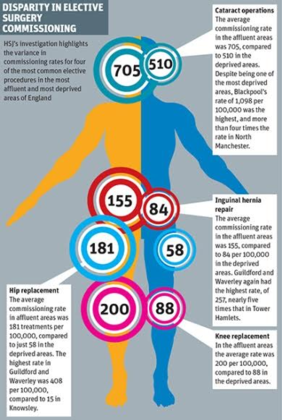 Wide variations in elective surgery rates among the most affluent and deprived areas in England raise serious questions about the use of NHS resources, a leading public health expert has warned.
Wide variations in elective surgery rates among the most affluent and deprived areas in England raise serious questions about the use of NHS resources, a leading public health expert has warned.
1 October, 2015 | By Lawrence Dunhill, Health Service Journal.
- HSJ investigation finds huge disparities in rates for elective surgery in affluent and deprived populations
- Experts warn the variance raises serious questions about use of NHS resources
- Disparity in elective surgery commissioning
HSJ’s investigation, which examined the rates for elective surgery funded by the clinical commissioning groups covering the 10 most affluent and 10 most deprived populations in the country, has revealed huge disparities. The 2014-15 data was obtained from the CCGs by Freedom of Information requests. All the average rates were calculated using NHS England’s weighted populations.
Charts: Disparity in elective surgery commissioning
These charts (click link above) are designed to take account of factors such as age and deprivation, and factor in the higher life expectancy in affluent CCG areas, as well as “unmet need” in deprived populations.
Findings highlighting the variance in rates for four of the most common elective procedures include:
- Hip replacement: The average rate in affluent areas was 181 treatments per 100,000, compared to just 58 in the deprived areas. The highest rate in Guildford and Waverley was 408 per 100,000, compared to 15 in Knowsley.
- Knee replacement: In the affluent areas the average rate was 200 per 100,000, compared to 88 in the deprived areas. Bracknell and Ascot had the highest rate, of 344 per 100,000, compared to 42 in Tower Hamlets.
- Inguinal hernia repair: The average rate in the affluent areas was 155, compared to 84 per 100,000 in the deprived areas. Guildford and Waverley again had the highest rate, of 257, nearly five times that in Tower Hamlets.
- Cataract operations: The average rate in the affluent areas was 705, compared to 510 in the deprived areas. Despite being one of the most deprived areas, Blackpool’s rate of 1,098 per 100,000 was the highest, and more than four times the rate in North Manchester.
10 most affluent and 10 most deprived CCG populations
Most affluent areas:
- Wokingham
- Rushcliffe
- Surrey Downs
- Surrey Heath
- Horsham and Mid Sussex
- Guildford and Waverley
- North East Hampshire and Farnham
- Bracknell and Ascot
- Windsor, Ascot and Maidenhead
- North West Surrey
Most deprived areas:
- Bradford City
- North Manchester
- Liverpool
- Newham
- City and Hackney
- Knowsley
- Sandwell and West Birmingham
- Birmingham South Central
- Blackpool
- Tower Hamlets
The 20 CCGs were selected using the deprivation scores in the Indices of Multiple Deprivation.
 John Appleby, chief economist of the King’s Fund, who highlighted similar trends in a 2011 report, said: “This once again highlights persistent and widespread variation in the use of surgical procedures. Some of this variation is justified but much of it is unwarranted, inefficient and unfair on patients. Tackling unwarranted variations in treatment is key to delivering better value in the NHS and meeting the productivity challenge.”
John Appleby, chief economist of the King’s Fund, who highlighted similar trends in a 2011 report, said: “This once again highlights persistent and widespread variation in the use of surgical procedures. Some of this variation is justified but much of it is unwarranted, inefficient and unfair on patients. Tackling unwarranted variations in treatment is key to delivering better value in the NHS and meeting the productivity challenge.”
The CCGs were also asked for their total spending on elective surgery, although these figures will be less robust as some have used different definitions. According to the figures provided, the CCGs in affluent areas spent £136 per head of population, compared to £102 in the deprived areas. “Much of the variation is inefficient and unfair on patients”, John Appleby said.
Sir Muir Gray, an adviser to Public Health England and director of Better Value Healthcare, highlighted HSJ’s findings when he launched the NHS Atlas of Variation last month. They were shared with hime earlier. He told HSJ: “This raises important issues about under-provision in the most deprived areas, and the possibility of overuse and oversupply in the most affluent areas. People from wealthier populations are perhaps getting these procedures done before the optimum point. We’re seeing an application of resources based on demand, but the NHS might be able to get more value by using the resources in other ways.”
He said the weighted populations may not fully account for the age related factors, but thought other factors could cause an opposite effect, such as the likelihood that more patients in affluent areas would receive non-NHS care.
CCG leaders outside the 20 also told HSJ they had serious concerns that their main provider was “driving demand” for elective surgery in order to maximise income via the payment by results system.
The findings for primary hip replacements in the atlas, which is based on data from 2012-13, are broadly in line with HSJ’s findings. There appears to be less correlation with deprivation on cataract surgery, however, while knee replacements and hernia repairs are not featured.
Some of the affluent population CCGs questioned the reliability of HSJ’s findings, suggesting the weighted populations may not fully take account of age-related factors. Some of the CCGs in deprived areas said cultural factors in areas with large ethnic populations meant patients were less likely to opt for surgery, and this would not be reflected in the figures. CCGs may also have used different procedure codes when responding.
However, James Blythe, director of commissioning and strategy for Surrey Downs CCG, said: “Taking into account the health needs of our ageing population, elective activity in some areas, such as hip, knee and cataract operations, is still higher than we might expect. In order to fully understand the reasons for this, we are currently undertaking a comprehensive review of planned care pathways.”
A spokesman for Guildford and Waverley CCG said an external review suggested its elective spending was “slightly above average, but not excessive”. He added that a Surrey priorities committee was “currently in discussion with orthopaedic colleagues about evidence based thresholds for hips and knee replacements which may reduce numbers in future”.
Bradford City CCG said it was currently investigating its low rates for hernia surgery. Its GP lead for partnerships and health inequalities, Ishtiaq Gilkar, added: “Bradford City CCG is fully committed to reducing the health inequalities associated with deprivation.”
A spokeswoman for Tower Hamlets and Newham CCGs said: “Some patients may present as emergencies rather than elective planned. There is significant evidence that late presentation of symptoms is more of an issue in areas of high deprivation and high population growth and turnover, such as east London, resulting in more emergency care. We also know that the same pattern is apparent within boroughs, whereby less deprived members of the population, tend to use more elective services than those who are less deprived.”
Sandwell and West Birmingham CCG said it did not commission any cataract operations in the last two years, but did not respond to requests for comment, and was discounted when calculating the average. Knowsley CCG said the atlas suggested it was not an outlier for hip replacement surgery. Blackpool CCG did not respond.


